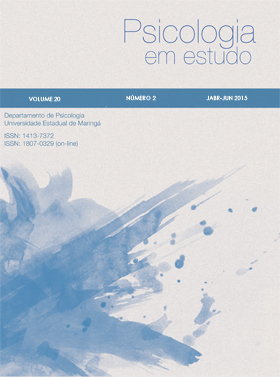O discurso construcionista social na prática clínica de terapeutas familiares
Résumé
O campo da terapia familiar (TF) é composto por diferentes propostas teóricas e epistemológicas. Recentemente, o construcionismo social tem contribuído para a configuração de novas práticas em TF, levando a uma maior ênfase nos processos de comunicação no contexto terapêutico. O objetivo deste estudo é investigar a difusão do construcionismo entre terapeutas familiares brasileiros. Participaram 14 terapeutas, homens e mulheres, psicólogos, que realizam atendimentos de famílias e são professores em cursos de formação em TF. Realizamos entrevistas semiestruturadas, que foram gravadas em áudio e transcritas literalmente. A partir das propostas construcionistas para a pesquisa científica, realizamos análise temática das informações. Nas cinco temáticas construídas, discutimos como os participantes descrevem o construcionismo e as implicações advindas em sua prática clínica. Concluímos que a difusão deste está atrelada à atribuição de utilidade aos conceitos teóricos, constituindo-se em porta de entrada para reflexões acerca da atuação clínica e cujas contribuições agregam novos elementos ao posicionamento do terapeuta.Téléchargements
Références
Anderson, H. (2012). Collaborative relationships and dialogic conversations: ideas for a relationally responsive practice. Family Process, 51(1), 8-24.
Anderson, H. & Goolishian, H. (1988). Human systems as linguistic system: preliminar and evolving ideas about the implication for clinical practice. Family Process, 27, 371-393.
Brasil, Ministério da Saúde (1996). Conselho Nacional de Saúde. Diretrizes e Normas Regulamentadoras de Pesquisas Envolvendo Seres Humanos – Resolução 196/96.
Costa, L. F. (2010). A perspectiva sistêmica para a clínica da família, Psicologia: Teoria e Pesquisa, 26, 95-104.
Dickerson, V. C. (2010). Positioning oneself within an epistemology: Refining out thinking about integrative approaches. Family Process, 49(3), 349-368.
Féres-Carneiro, T. (1996). Terapia familiar: das divergências às possibilidades de articulação dos diferentes enfoques. Psicologia Ciência e Profissão, 16, 38-42.
Flaskas, C. (2010). Frameworks for practice in the systemic field: Part 1 – Continuities and transitions in family therapy knowledge. Australian and New Zealand Journal of Family Therapy, 31(3). 232-247.
Flaskas, C. (2011). Frameworks for practice in the systemic field: Part 2 – Contemporary frameworks in family therapy. Australian and New Zealand Journal of Family Therapy, 32(2), 87-108.
Gergen, K. J. (1985). The social constructionism movement in modern psychology. American Psychologist, 266-275.
Gergen, K. J. (1997). Realities and relationships: soundings in social construction. London: Harvard University Press.
Gergen, K, & Warhuss, L. (2001). Terapia como construção social: características, reflexões e evoluções. In M. M. Gonçalves & O. F. Gonçalves (Orgs). Psicoterapia, Discurso e Narrativa: a construção conversacional da mudança (pp. 27-64). Coimbra, Portugal: Quarteto Editora.
Gergen, K. J. (2009). Relational Being: Beyond self and community. New York: Oxford University Press.
Guanaes, C. (2006). A construção da mudança em terapia de grupo: um enfoque construcionista social. São Paulo: Vetor.
Harré, R. & van Langenhove, L. (1999). Positiong theory: moral contexts of intentional action. New York: Blackwell Publishers.
Macedo, R. M. (1994). A família do ponto de vista psicológico: um lugar seguro para crescer? Cadernos de Pesquisa, 91, 62-68.
McNamee, S. (2014). Construindo conhecimento/construindo investigação: coordenando mundos de pesquisa (P.P.S. Martins, trad.). In C. Guanaes-Lorenzi; M. Moscheta; C. M. Corradi-Webster & L. V. Souza (Orgs). Construcionismo social: discurso, prática e produção do conhecimento (pp.105-132). Rio de Janeiro: Instituto Noos.
Moscheta, M. (2014). A pós-modernidade e o contexto para a emergência do discurso construcionista social. In C. Guanaes-Lorenzi; M. Moscheta; C. M. Corradi-Webster & L. V. Souza (Orgs). Construcionismo social: discurso, prática e produção do conhecimento (pp.23-48). Rio de Janeiro: Instituto Noos.
Pinheiro, O. (1999). Entrevista: uma prática discursiva. In M. J. P. Spink (Org.), Práticas discursivas e produção de sentidos: aproximações teóricas e metodológicas (pp. 183-214). São Paulo: Cortez.
Ponciano, E. L. T. & Féres-Carneiro, T. (2006). Terapia de família no Brasil: uma visão panorâmica. Psicologia: Reflexão e Crítica, 19(2), 252-260.
Rapizo, R. (2002). Terapia Sistêmica de Família (2a ed). Rio de Janeiro: Instituto NOOS.
Rhodes, P. (2012). Nothing to fear? Thoughts on the history of family therapy and the potential contribution of research. The Australian and New Zealand Journal of Family Therapy, 33(2), 171-182.
Spink, M. J. P. (2010). Ser fumante em um mundo antitabaco: reflexões sobre riscos e exclusão social. Saúde e Sociedade, 19(3), 481-496.
Strong, T. (2002). Collaborative “expertise” after the discursive turn. Journal of Psychotherapy Integration, 12(2), 218-232.
Strong, T. & Gale, J. (2013). Postmodern clinical research: In and out the margins. Jounal of Systemic Therapies, 32(2), 46-57.
As opiniões emitidas, são de exclusiva responsabilidade do(s) autor(es). Ao submeterem o manuscrito ao Conselho Editorial de Psicologia em Estudo, o(s) autor(es) assume(m) a responsabilidade de não ter previamente publicado ou submetido o mesmo manuscrito por outro periódico. Em caso de autoria múltipla, o manuscrito deve vir acompanhado de autorização assinada por todos os autores. Artigos aceitos para publicação passam a ser propriedade da revista, podendo ser remixados e reaproveitados conforme prevê a licença Creative Commons CC-BY.
The opinions expressed are the sole responsibility of the author (s). When submitting the manuscript to the Editorial Board of Study Psychology, the author (s) assumes responsibility for not having previously published or submitted the same manuscript by another journal. In case of multiple authorship, the manuscript must be accompanied by an authorization signed by all authors. Articles accepted for publication become the property of the journal, and can be remixed and reused as provided for in theby a license Creative Commons CC-BY.
















